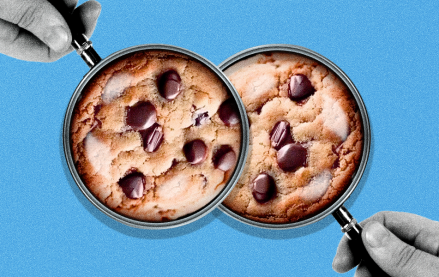PepsiCo wants to remain a ‘driver of culture’ as it turns to influencers and activations amid rebrand

As a Digiday+ member, you were able to access this article early through the Digiday+ Story Preview email. See other exclusives or manage your account.This article was provided as an exclusive preview for Digiday+ members, who were able to access it early. Check out the other features included with Digiday+ to help you stay ahead
Beverage sales at PepsiCo, which owns Mountain Dew, Gatorade and Dr Pepper as well as its core Pepsi line, have been falling lately.
Sales of its drinks portfolio fell 1% in 2023, with a 5% decline in North America and 3% in European markets, according to its latest earnings report. To arrest that decline and boost household penetration, the company is in the midst of a global campaign to gradually introduce its rebranded Pepsi (officially launched in March) to consumers.
Much of that campaign, and of the arguments its marketers make for advertising spend internally, rests upon the company’s cultural connections. “Pepsi has always been a believer and a driver of culture,” Eric Melis, vp of global brand marketing at PepsiCo told Digiday.
Adding to its long-lasting associations with live music and soccer, the company has embraced a variety of buzzy routes to younger audiences. There have been drone installations above Dubai’s skyline, a CG can towering over London’s East India docks and on-the-ground experiential marketing amplified by creator partnerships.
PepsiCo is one of several major advertisers to refocus its attention upon brand-building activity. Marketers have been turned off by a crowded, confusing and opaque performance advertising economy and, as media consumption habits have fractured, remembered the value of brand-building.
Ad position: web_incontent_pos1
Cultural relevance is an increasingly popular goal among brand marketers keen to cut through a saturated media landscape, as Digiday reported in January.
The brand’s media strategy differs from market to market, Melis said, but is broadly prioritizing linear TV spend, paid social and creator partnerships. That mix includes experiments with retail media networks, a channel Melis expects to play a greater role in future campaigns, though he declined to share details of which networks the advertiser was using. “It’s important for us to build brands with an end-to-end mindset,” he said.
Though PepsiCo has carved out a place in its budget for lower-funnel activity (such as cinema inventory intended to boost on-trade sales), the advertiser is primarily focused on brand-building opportunities and the campaign, Melis said, aims to bring “emotions and engaging content” to the fore.
Ad position: web_incontent_pos2
In the U.K., the company transformed a Manchester cornershop into a Pepsi MAX-branded nightspot with live DJ sets, nostalgic pick n’ mix candy and mountains of soda.
The cornershop pop-up, and the landmark installations, as well as PepsiCo’s soccer sponsorships, are part of its ongoing effort to remain culturally relevant, Melis said.
In order to “keep that iconic brand status,” he said, the company must “continue driving cultural dialogue and being culturally famous.”
Melis calls influencer-led activations like the cornershop pop-up examples of “retail-tainment,” a concept he said was “very important” to PepsiCo. “We want to show up in stores in new ways, in unique ways — disruptive ways,” he added. In plainer terms, that means deploying ad creative that reinforces the link between sales and Pepsi’s cultural links.
Its latest TV ad, for example, plays upon its associations with celebrity culture and sport. The spot featuring top European club soccer players such as Jack Grealish and Vinicius Jr. competing in a street soccer challenge — at one point, stopping play to preen and review a pending social media post. At the end of the ad, the loser of the challenge has to pay for their friend’s Pepsi at a nearby shop.
PepsiCo increased its marketing and media budget 20% between 2018 and 2023, according to last year’s company annual general meeting. Melis credited PepsiCo’s global in-house marketing team for coordinating the campaign’s creative outputs and planning how to use its considerable media budget.
PepsiCo’s next annual general meeting (due this Wednesday) will likely reveal how much it’s spent in the last 12 months, but with a major rebrand and accompanying global campaign in tow, it’s likely increased again.
To justify that level of spending, Melis said that PepsiCo uses KPIs such as purchase intent, brand consideration and “brand love.” The firm combines those with extensive pre-launch campaign testing, he said, to reinforce the internal case for marketing investment.
Evan Horowitz, chief executive officer and founder of agency Movers+Shakers, told Digiday that such a strategy is key for brands that want to reach younger consumers. “Younger consumers are looking for a more personal relationship with a brand. That’s a huge opportunity for brands to show up,” he said. Activity aimed at building cultural relevance, he said, can help companies such as PepsiCo bring in new audiences and reinforce existing relationships.
“By building cultural relevance they build more of that emotional connection with their brand,” he added.
For Melis, it’s also key to making the case for investment to his C-suite colleagues. “Driving human-centric content will not only drive results in terms of brand equity, but business performance — not just in the short term but the long term,” he said.
”At PepsiCo, CMOs and CFOs are completely aligned. We see the case for investing behind marketing that has substance, that is grounded in solving consumer problems, and doing it in unique ways.”
More in Marketing

In the marketing world, anime is following in the footsteps of gaming
As marketers look to take advantage of anime’s entry into the zeitgeist, they might be wise to observe the parallels between the evolution of anime as a marketing channel and the ways brands have learned to better leverage gaming in recent years.

With the introduction of video ads and e-commerce, Roblox looks to attain platform status
Roblox is expanding into more areas than just ads in 2024. Much like platforms such as Amazon and Facebook have transcended their origins to evolve from their origins as online marketplaces and social media channels, Roblox is in the midst of a transformation into a platform for all elements of users’ virtual lives.

‘It hasn’t changed our plans’: Despite Google’s cookie setback, Vodafone presses forward in search for alternatives
Vodafone is working with Adform in its search for alternatives to third-party cookies.
Ad position: web_bfu




